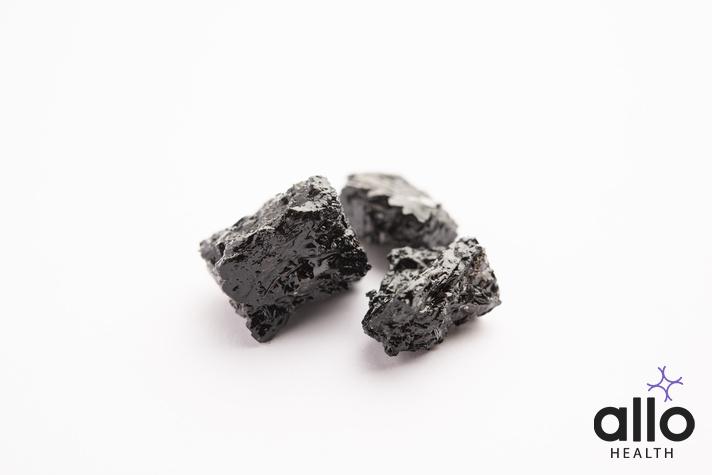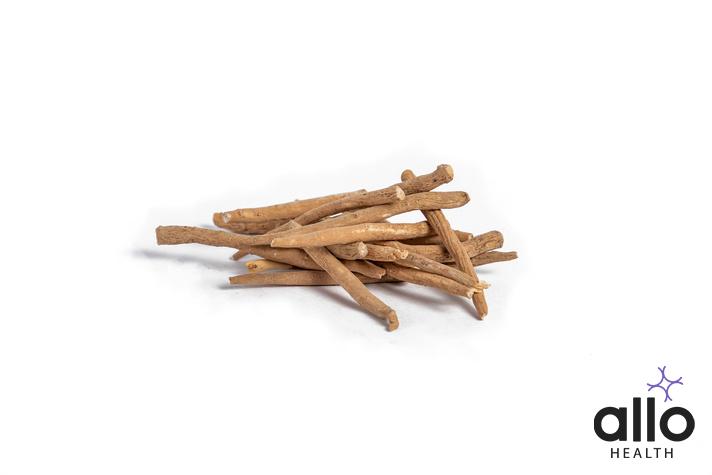Shilajit Vs Ashwagandha for Sexual Health

Allo Health is dedicated to personalized well-being, offering support and trusted information tailored to individual health goals. The platform emphasizes human-generated content, led by a distinguished medical team of experts, including physicians and sexual health specialists. Their commitment to credibility involves rigorous fact-checking, authoritative research, and continuous updates to ensure accurate, up-to-date information. Allo Health's unique approach goes beyond conventional platforms, providing expert-led insights and a continuous commitment to excellence, with user feedback playing a crucial role in shaping the platform's authoritative voice.

Dr.Sushma.V completed MBBS degree from BGS GIMS,bangalore
Why This Was Upated?
Our experts continually monitor the health and wellness space, and we update our articles when new information became available.
Updated on 02 June, 2024
- Article was updated as part of our commitment to diversity, equity, and inclusion.

"The following blog article discusses alternative medicine practices and their potential effects or benefits. However, it is important to note that the information provided is for general educational purposes only and should not be considered as medical advice or a substitute for professional guidance from a qualified healthcare professional. Before considering any alternative medicine practices or treatments, it is recommended to consult with a healthcare professional.
Book consultation
Alternative medicine encompasses a wide range of practices that may not have undergone rigorous scientific evaluation or received widespread acceptance within the medical community. The effectiveness, safety, and appropriateness of alternative medicine practices can vary significantly depending on the individual, their specific medical conditions, and other factors.
It is important to approach alternative medicine practices with caution and skepticism. Some practices may carry potential risks or interact with existing medical treatments. A healthcare professional can provide guidance based on your medical history, evaluate the available evidence, and offer informed advice regarding the potential benefits and risks of alternative medicine practices.
Individuals with specific medical conditions, allergies, or taking medications should exercise particular caution when considering alternative medicine practices. Some practices may have contraindications or adverse effects, and it is essential to discuss these potential concerns with a healthcare professional before pursuing any alternative treatments."
Ayurveda, an ancient Indian system of medicine, utilizes natural remedies to address various ailments. Two of the most popular Ayurvedic supplements are Shilajit and Ashwagandha. Both supplements are believed to have various health benefits, especially sexual health.
What is Shilajit?
- Shilajit is a natural substance that is commonly used in traditional Ayurvedic medicine.
- It is primarily found in the Himalayan region and is formed from the decomposition of plant material over centuries.
- This resin-like substance is rich in minerals, fulvic acid, and humic acid, which are believed to offer various health benefits.
- In Ayurvedic practices, Shilajit is considered a powerful adaptogen, meaning it is believed to help the body adapt to stress and restore balance.
- It is often used to support energy levels, cognitive function, and overall vitality.
- Shilajit is thought to have antioxidant properties, which can help protect cells from damage caused by free radicals.
- While Shilajit has a long history of use in traditional medicine, scientific research on its benefits is still ongoing. If you’re considering using Shilajit or any other natural supplement, it’s advisable to consult with a healthcare professional, especially considering individual health needs and any existing medical conditions.
Nutritional Content:
- Minerals: Shilajit is known to contain a wide array of essential minerals including magnesium, calcium, iron, zinc, copper, and selenium. These minerals play crucial roles in various bodily functions, from bone health to enzyme activity.
- Fulvic Acid: One of the most significant components of Shilajit is Fulvic acid. It is a type of organic acid that forms during the decomposition of plant material. Fulvic acid is known for its potential to enhance nutrient absorption, making it an important factor in the overall bioavailability of nutrients.
- Humic Acid: Similar to Fulvic acid, Humic acid is another organic compound found in Shilajit. It is known for its antioxidant properties, which can help protect cells from damage caused by free radicals.
- Trace Elements: Shilajit contains various trace elements like strontium, barium, rubidium, and others. While these elements are required in smaller quantities, they still play essential roles in maintaining good health.
- Amino Acids and Vitamins: Although Shilajit is not a primary source of amino acids and vitamins, it may contain small amounts of these essential nutrients.
- Secondary Metabolites: Shilajit can also contain secondary metabolites like triterpenes, sterols, and aromatic carboxylic acids, which may contribute to its potential health benefits.
It’s important to keep in mind that the exact composition of Shilajit can vary depending on its source and processing methods.
What is Ashwagandha?
Ashwagandha, scientifically known as Withania somnifera, is a popular herb in traditional Ayurvedic medicine. It is native to India and has been used for thousands of years for its potential health benefits.
The name “Ashwagandha” is derived from the Sanskrit words “ashva,” which means horse, and “gandha,” which means smell. This is because the root of the plant is said to have a strong horse-like odor.
Some key aspects of Ashwagandha:
- Adaptogenic Properties: Ashwagandha is classified as an adaptogen, which means it is believed to help the body adapt to stress and promote overall balance. It is often used to support the body’s resilience to physical and mental stressors.
- Active Compounds: The root of the Ashwagandha plant contains a group of active compounds, including withanolides, alkaloids, and steroidal lactones. These compounds are believed to contribute to its potential health benefits.
- Potential Benefits: Ashwagandha is traditionally used to address a wide range of health concerns. It is believed to support the immune system, promote vitality and energy, enhance cognitive function, and improve overall well-being. It is also known for its potential to help manage stress and anxiety.
- Antioxidant Properties: Ashwagandha is thought to have antioxidant properties, which can help protect cells from damage caused by free radicals.
- Potential for Sexual Wellness: In the context of sexual wellness, Ashwagandha is sometimes used to support reproductive health, including libido and fertility. It is believed to have adaptogenic effects that may indirectly contribute to improved sexual health.
Nutritional Content
Ashwagandha, while not typically consumed as a food with a defined nutritional profile, contains a variety of bioactive compounds that contribute to its health benefits.
- Withanolides: Withanolides are a group of naturally occurring steroid lactones found in Ashwagandha. They are considered the primary bioactive compounds responsible for many of its therapeutic effects, including adaptogenic and anti-inflammatory properties.
- Alkaloids: Ashwagandha contains alkaloids like somniferine and somniferinine. These compounds are believed to contribute to the herb’s adaptogenic and sedative effects.
- Amino Acids: While Ashwagandha is not a significant source of amino acids, it does contain small amounts of these building blocks of proteins.
- Sterols: Sterols are a type of plant-based compound that have structural similarity to cholesterol. They play various roles in cellular function.
- Saponins: Saponins are glycosides found in many plant species, including Ashwagandha. They are known for their potential to boost the immune system.
- Flavonoids: Ashwagandha contains flavonoids, which are antioxidants that help protect cells from damage.
- Vitamins and Minerals: While not a rich source, Ashwagandha contains small amounts of certain vitamins and minerals, including vitamin C, calcium, and iron.
Specific composition of Ashwagandha can vary depending on factors such as the growing conditions, processing methods, and the part of the plant used.

Shilajit Vs Ashwagandha
| Aspect | Shilajit | Ashwagandha |
|---|---|---|
| Primary Benefits | Believed to enhance vitality and energy. May support reproductive health. Potential adaptogenic effects | Traditionally used to manage stress and anxiety. Believed to support reproductive health. Potential adaptogenic effects |
| Active Compounds | Rich in minerals, fulvic acid, humic acid. Contains trace elements and secondary metabolites | Contains withanolides (active compounds). Also contains alkaloids, amino acids, sterols, and saponins |
| Adaptogenic Properties | Yes, considered an adaptogen | Yes, classified as an adaptogen |
| Libido Enhancement | Believed to indirectly contribute to improved sexual health | May help improve libido and sexual function |
| Stress Management | May aid in stress adaptation and reduction | Known for its potential to manage stress and anxiety |
| Potential Side Effects | Generally considered safe when used as directed, but individual reactions may vary | Generally considered safe, but may interact with certain medications or have contraindications for certain medical conditions |
| Dosage Recommendations | Dosage may vary depending on the form (capsules, resin, powder) and source | Typical dosages range from 300-600 mg of standardised extract per day |
| Cautions | Should be sourced from reputable suppliers. Consult a healthcare professional before use, especially for individuals with underlying health conditions | Consult a healthcare professional before use, especially for individuals with underlying health conditions |
| Available Forms | Capsules, resin, powder | Capsules, powder, tincture, extract |
| Scientific Research | Ongoing research on its potential benefits, but more studies are needed for conclusive evidence | Ongoing research on its potential benefits, but more studies are needed for conclusive evidence |
Shilajit Vs Ashwagandha for Sexual Health
| Aspect | Shilajit | Ashwagandha |
|---|---|---|
| Libido Enhancement | Believed to indirectly contribute to improved sexual health | May help improve libido and sexual function |
| Reproductive Health | Traditionally used to support reproductive health | Believed to support reproductive health |
| Erectile Function | May potentially contribute to improved erectile function | Some studies suggest it may support erectile function |
| Sperm Quality | Believed to have potential benefits for sperm quality and motility | Some research indicates it may improve sperm quality |
| Stress Reduction | May indirectly benefit sexual health by reducing stress levels | Known for its potential to manage stress and anxiety, which can indirectly benefit sexual health |
| Overall Sexual Well-being | Believed to contribute to overall sexual vitality and well-being | May enhance overall sexual well-being |
Scientific Evidence for Shilajit and Ashwagandha
- While Shilajit and Ashwagandha have been traditionally esteemed for their potential benefits in sexual health, scientific evidence supporting their efficacy in this specific domain is currently limited and often inconclusive.
- While some studies have explored their effects, results have been mixed, and more rigorous research is needed to draw definitive conclusions.
- Shilajit and Ashwagandha should not be viewed as substitutes for professional medical advice or treatment for sexual health concerns.
- Sexual health is integral to overall wellbeing, and seeking evidence-based approaches and consulting a healthcare professional is paramount for addressing any related concerns effectively and safely.

Key Takeaways
- Shilajit is a natural substance in Ayurvedic medicine, primarily found in the Himalayan region. It is rich in minerals, fulvic acid, and humic acid, believed to offer health benefits. Shilajit acts as an adaptogen, aiding stress adaptation and restoration of balance. It also supports energy levels, cognitive function, and vitality, while containing antioxidants to protect against cellular damage.
- Ashwagandha, scientifically known as Withania somnifera, is an ancient herb native to India, valued for its adaptogenic properties that aid in stress management and overall balance, along with a range of potential health benefits including immune support, cognitive enhancement, and reproductive health.
- The scientific evidence for Shilajit and Ashwagandha in sexual health is currently limited and inconclusive; emphasizing the importance of evidence-based approaches and consulting healthcare professionals for comprehensive sexual health care.
Frequently Asked Questions
Q: Is Shilajit safe for everyone to use?
A: While generally considered safe, individuals with specific medical conditions, such as kidney disorders or high blood pressure, should consult a healthcare professional before using Shilajit.
Q: Can Shilajit interact with medications or other supplements?
A: Yes, Shilajit may interact with certain medications or supplements. It’s crucial to consult a healthcare professional, especially if you are on medication for existing health conditions.
Q. Can Ashwagandha be taken with other herbal supplements or medications?
A: It’s important to consult a healthcare professional before combining Ashwagandha with other supplements or medications, as there may be potential interactions.
Q: Can Ashwagandha be taken long-term, or is it recommended for short-term use only?
A: Ashwagandha can be taken long-term, but the duration of use may vary based on individual health goals. Consulting a healthcare professional can help determine the most suitable approach.






































